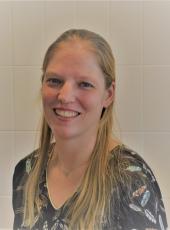
Kim
De Veirman
Contact
Talenkennis
Achtergrond
Lid Belgian Hematology Society
Lid European Association of Hematology
Studie(s) en diploma's
2016: PhD in Medical Sciences, Faculty of Medicine, Hematology and Immunology department, VUB, Belgium. PhD thesis: “The role of the bone marrow derived bystander cells in the development of multiple myeloma” (promotor: Prof. Karin Vanderkerken)
2011: Master in Biomedical Sciences, VUB, Belgium. Title thesis: “Effect of the HDAC inhibitor vorinostat on the osteogenic differentiation of mesenchymal stem cells in vitro and bone formation in vivo” (promotor: Prof. Ivan Van Riet), Magna cum laude
2010: Felasa C equivalent, VUB
2009: Bachelor in Biomedical Sciences, VUB, Belgium
Huidige functieomschrijving
* Senior Postdoctoral fellow of the ‘Fonds voor Wetenschappelijk Onderzoek Vlaanderen (FWO)’, Faculty of Medicine, Hematology and Immunology department, VUB, Belgium. (topic: NANObody-based therapies to eradicate REsidual disease in Multiple Myeloma)
* Associate professor (10%); Faculty of Medicine, Hematology and Immunology department, VUB, Belgium
Ervaring
Ervaring in hematologische kankers (Multipel Myeloom, Acute Myeloide Leukemie), drug resistentie, immunologie, muismodellen, tumoromgeving
Relevante Publicaties
5 publicaties geselecteerd van de 36 (H-index 19):
1. A Niche-Dependent Myeloid Transcriptome Signature Defines Dormant Myeloma Cells. Khoo WH, Ledergor G, Weiner A, Roden DL, Terry RL, McDonald MM, Chai RC, De Veirman K, Owen KL, Opperman KS, Vandyke K, Clark JR, Seckinger A, Kovacic N, Nguyen A, Mohanty ST, Pettitt JA, Xiao Y, Corr AP, Seeliger C, Novotny M, Lasken RS, Nguyen TV, Oyajobi BO, Aftab D, Swarbrick A, Parker B, Hewett DR, Hose D, Vanderkerken K, Zannettino ACW, Amit I, Phan TG, Croucher PI. Blood. 2019; 134(1):30-43. (SCI-IF: 17.543, Q1)
2. Myeloid-derived suppressor cells induce multiple myeloma cell survival by activating the AMPK pathway. De Veirman K, Menu E, Maes K, De Beule N, De Smedt E, Maes A, Vlummens P, Fostier K, Kassambara A, Moreaux J, Van Ginderachter JA, De Bruyne E, Vanderkerken K, Van Valckenborgh E. Cancer Lett. 2018; 442:233-241. (SCI-IF: 6.491, Q1)
3. Extracellular S100A9 protein in bone marrow supports multiple myeloma survival by stimulating angiogenesis and cytokine secretion. De Veirman K, De Beule N, Maes K, Menu E, De Bruyne E, De Raeve H, Fostier K, Moreaux J, Kassambara A, Hose D, Heusschen R, Eriksson H, Vanderkerken K, Van Valckenborgh E. Cancer Immunol Res. 2017; 5(10):839-846. (SCI-IF: 9.195, Q1)
4. Induction of miR-146a by multiple myeloma cells in mesenchymal stromal cells stimulates their pro-tumoral activity. De Veirman K, Wang J, Song X, Leleu X, Himpe E, Maes K, De Bruyne E, Van Valckenborgh E, Vanderkerken K, Menu E, Van Riet I. Cancer Lett. 2016; 377(1):17-24. (SCI-IF: 6.791, Q1)
5. Halting pro-survival autophagy by TGFβ inhibition in bone marrow fibroblasts overcomes bortezomib resistance in multiple myeloma patients. Frassanito MA*, De Veirman K*, Desantis V, Di Marzo L, Vergara D, Ruggieri S, Annese T, Nico B, Menu E, Catacchio I, Ria R, Racanelli V, Maffia M, Angelucci E, Derudas D, Fumarulo R, Dammacco F, Ribatti D, Vanderkerken K and Vacca A. Leukemia. 2015; 1-9. (*equally contributed) (SCI-IF: 10.43, Q1)